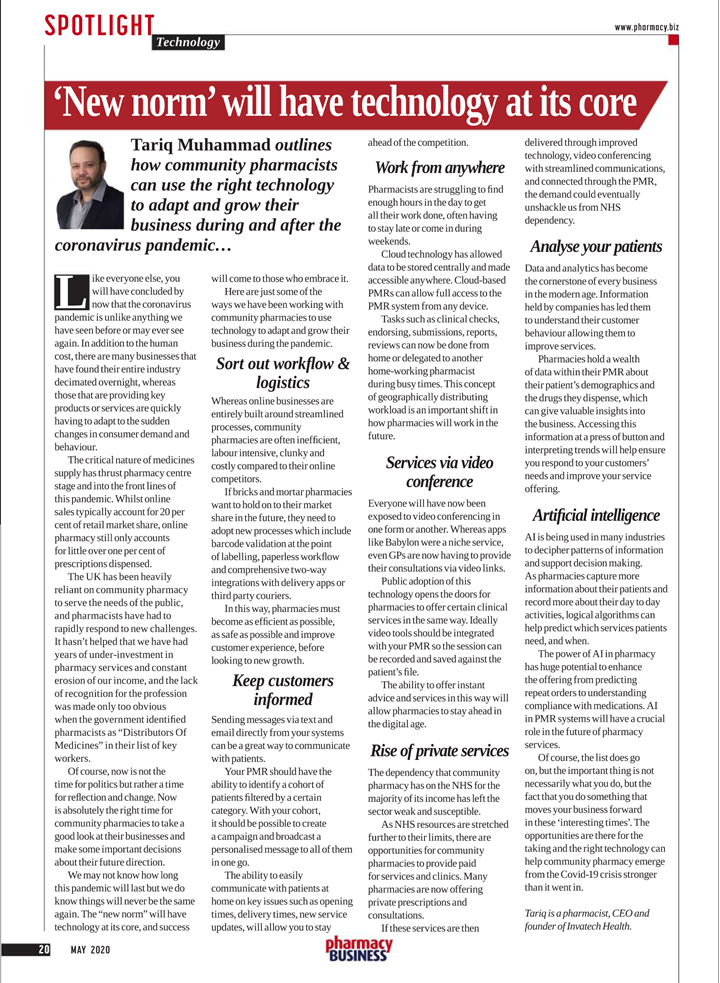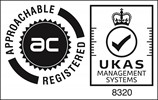New Norm Will Have Technology At Its Core
Like everyone else, you will have concluded by now that the Coronavirus pandemic is unlike anything we have seen before or may ever see again. In addition to the human cost, there are many businesses that have found their entire industry decimated overnight, whereas those that are providing key products or services are quickly having to adapt to the sudden changes in consumer demand and behaviour.
The critical nature of medicines supply has thrust pharmacy centre stage and into the front lines of this pandemic. Whilst online sales typically account for 20% of retail market share, online pharmacy still only accounts for little over 1% of prescriptions dispensed. The UK has been heavily reliant on community pharmacy to serve the needs of the public, and pharmacists have had to rapidly respond to new challenges. It hasn’t helped that we have had years of under-investment in pharmacy services and constant erosion of our income, and the lack of recognition for the profession was made only too obvious when the government identified pharmacists as “Distributors Of Medicines” in their list of key workers.
Of course, now is not the time for politics but rather a time for reflection and change. Now is absolutely the right time for community pharmacies to take a good look at their businesses and make some important decisions about their future direction. We may not know how long this pandemic will last but we do know things will never be the same again. The “new norm” will have technology at its core, and success will come to those who embrace it.
Here are just some of the ways we have been working with community pharmacies to use technology to adapt and grow their business during the pandemic.
1. Sort Out Workflow & Logistics
Whereas online businesses are entirely built around streamlined processes, community pharmacies are often inefficient, labour intensive, clunky and costly compared to their online competitors. If bricks and mortar pharmacies want to hold on to their market share in the future, they need to adopt new processes which include barcode validation at the point of labelling, paperless workflow and comprehensive two-way integrations with delivery apps or third party couriers. In this way, pharmacies must become as efficient as possible, as safe as possible and improve customer experience, before looking to new growth.
2. Keep Customers Informed With Campaigns
Sending messages via text and email directly from your systems can be a great way to communicate with patients. Your PMR should have the ability to identify a cohort of patients filtered by a certain category. With your cohort, it should be possible to create a campaign and broadcast a personalised message to all of them in one go. The ability to easily communicate with patients at home on key issues such as opening times, delivery times, new service updates, will allow you to stay ahead of the competition.
3. Work from Anywhere
Pharmacists are struggling to find enough hours in the day to get all their work done, often having to stay late or come in during weekends. Cloud technology has allowed data to be stored centrally and made accessible anywhere. Cloud-based PMRs can allow full access to the PMR system from any device. Tasks such as clinical checks, endorsing, submissions, reports, reviews can now be done from home or delegated to another home-working pharmacist during busy times. This concept of geographically distributing workload is an important shift in how pharmacies will work in the future.
4. Services via Video conference
Everyone will have now been exposed to video conferencing in one form or another. Whereas apps like Babylon were a niche service, even GPs are now having to provide their consultations via video links. Public adoption of this technology opens the doors for pharmacies to offer certain clinical services in the same way. Ideally video tools should be integrated with your PMR so the session can be recorded and saved against the patient's file. The ability to offer instant advice and services in this way will allow pharmacies to stay ahead in the digital age.
5. The Rise of Private Services
The dependency that community pharmacy has on the NHS for the vast majority of its income has left the sector weak and susceptible. As NHS resources are stretched further to their limits, there are opportunities for community pharmacies to provide paid for services and clinics. Many pharmacies are now offering private prescriptions and consultations. If these services are then delivered through improved technology, video conferencing with streamlined communications, and connected through the PMR, the demand could eventually unshackle us from NHS dependency.
6. Analyse Your patients
Data and analytics has become the cornerstone of every business in the modern age. Information held by companies has led them to understand their customer behaviour allowing them to improve services. Pharmacies hold a wealth of data within their PMR about their patient’s demographics and the drugs they dispense, which can give valuable insights into the business. Accessing this information at a press of button and interpreting trends will help ensure you respond to your customers' needs and improve your service offering.
7. Artificial Intelligence
AI is being used in many industries to decipher patterns of information and support decision making. As pharmacies capture more information about their patients and record more about their day to day activities, logical algorithms can help predict which services patients need, and when. The power of AI in pharmacy has huge potential to enhance the offering from predicting repeat orders to understanding compliance with medications. AI in PMR systems will have a crucial role in the future of pharmacy services.
Of course the list does go on, and these are just some of the technological concepts we have been implementing in Titan. The important thing is not necessarily what you do, but the fact that you do something that moves your business forward in these ‘interesting times’. The opportunities are there for the taking and the right technology can help community pharmacy emerge from the Covid-19 crisis stronger than it went in.










